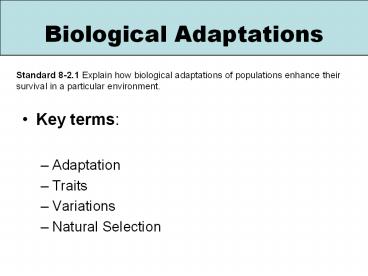Biological Adaptations PowerPoint PPT Presentation
1 / 23
Title: Biological Adaptations
1
Biological Adaptations
Standard 8-2.1 Explain how biological adaptations
of populations enhance their survival in a
particular environment.
- Key terms
- Adaptation
- Traits
- Variations
- Natural Selection
2
Adaptations
- TRAIT characteristic that helps an organism
survive in its environment. - Examples how do the traits of the animals listed
below help them survive? - The giraffes neck.
- The skunks smell.
- The Lions color and claws
- The Polar Bear coat, color, claws
- Shark sense of smell
- Hunting Dogs ears
3
(No Transcript)
4
http//www.cbsnews.com/stories/2010/03/13/earlysho
w/saturday/main6295145.shtml
5
(No Transcript)
6
(No Transcript)
7
(No Transcript)
8
(No Transcript)
9
Traits
- Traits are genetic differences that occur in a
species. - Traits are developed as an animal adapts to its
environment.
10
Types of Traits
- Color
- Camouflage
- Food gathering (beaks and claws)
- Hair
- Sensory abilities
- Behaviors
11
Variations
- VARIATIONS means that there are changes in the
genes among the same species. - For example, humans have different hair, eye or
skin color. - Sometimes these changes provide an advantage to
an organisms survival.
12
(No Transcript)
13
(No Transcript)
14
(No Transcript)
15
ARE TWO HEADS BETTER THAN ONE???
16
(No Transcript)
17
Monkey Faced Pig
18
A kitten named Cy was born with a defect called
holoprosencephaly. Animals born with
holoprosencephaly are born with one eye and an
unformed brain. Little Cy, adorable despite his
deformity, sadly lived less than twenty-four
hours after his birth.
19
(No Transcript)
20
Natural Selection
- Species in a particular environment that are
better adapted to living conditions there, are
more likely to survive. SURVIVAL OF THE
FITTEST! - These species will then begin to produce
offspring with these traits.
21
Evolution
A gradual process in which something changes into
a different and usually more complex or better
form.
- Natural selection explains this process and how
species can change over time. - Example Horses evolved from small, multi-toed
animals into the large, hoofed animals of today. - Why? Expanding grasslands favored grazing plant
eaters.
22
In biology, evolution is change in the inherited
traits of a population of organisms from one
generation to the next. These changes are caused
by a combination of three main processes
variation, reproduction, and selection. Genes
that are passed on to an organism's offspring
produce the inherited traits that are the basis
of evolution. These traits vary within
populations, with organisms showing heritable
differences in their traits. When organisms
reproduce, their offspring may have new or
altered traits. These new traits arise in two
main ways either from mutations in genes, or
from the transfer of genes between populations
and between species.
23
(No Transcript)

